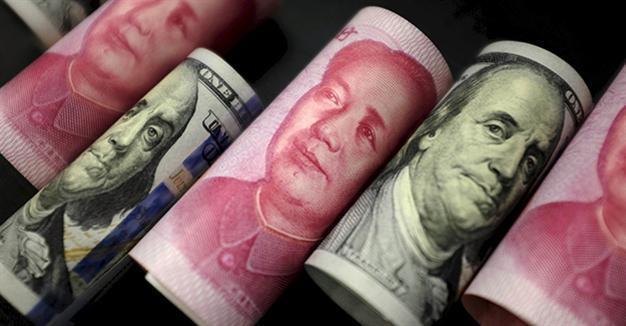China forex reserves fall lowest since late 2011
BEIJING - Reuters

U.S. 100 dollar banknotes and Chinese 100 yuan banknotes are seen in this file picture illustration taken January 21, 2016. REUTERS Photo
China’s foreign exchange reserves fell $28.75 billion in February, slightly less than expected and easing from a sharp slump in January, suggesting the Central Bank is scaling back its interventions to support the yuan as capital outflows ease.
Still, China’s foreign reserves declined for a fourth straight month, and the $3.20 trillion at the end of February was the lowest level since December 2011, data from the People’s Bank of China showed on March 7.
Economists polled by Reuters had predicted reserves would fall $30 billion from $3.23 trillion at the end of January.
They had sunk $99.5 billion in January and $107.9 billion in December, which was the biggest monthly drop on record.
China’s reserves are still the world’s largest, but it has been burning through them at such a pace that some think Beijing might soon have to allow a sharp fall in the value of the yuan or back-pedal on liberalization and tighten its capital controls.
Capital outflows have increased since China’s surprise devaluation of the yuan last August, and have been fanned by concerns about its economic slowdown and expectations of U.S. interest rate rises. That has prompted the central bank to sell dollars in the currency markets to support the yuan.
“In February the government instituted a lot of administrative measures, which may have been able to slow down the outflows,” Kevin Lai, chief economist of Asia ex-Japan at Daiwa Capital Markets said in a note.
China’s reserves fell $513 billion in 2015, the largest annual drop in history.
On March 4, the Central Bank’s vice governor told the official Securities Times that declines in foreign reserves will moderate this year in line with expectations that the yuan will stabilize. The bank’s Governor Zhou Xiaochuan also said during a just-ended G20 meeting that changes in China’s foreign reserves were normal.
Outflows may cool as the yuan steadies, partly due to a broad-based dollar retreat, but analysts believe the central bank faces a tough job keeping the yuan stable, especially as the economy faces persistent downward pressure.
While Chinese officials insist they see no reason for further depreciation, analysts believe the yuan will weaken 3.5 percent against the dollar over the next 12 months, though a sharp, one-off devaluation is not on horizon, according a Reuters survey.
The yuan has weakened about 5 percent against the dollar since the August devaluation, but less against a basket of currencies which China is increasingly referencing in hopes of making exchange rate movements less volatile.
China’s gold reserves stood at $71.01 billion at the end of February, up from January’s $63.57 billion, the People’s Bank of China said on its website.
By volume, gold reserves rose to 57.5 million troy ounces in February, up from 57.18 million at the end of January.
Worries about China’s foreign exchange rate policy flared again in early January when the Central Bank suddenly allowed the yuan to slide sharply, raising fears it could set off a global currency war.
But, as in the aftermath of the August devaluation, authorities quickly and forcefully intervened to head off a sharper slide.
